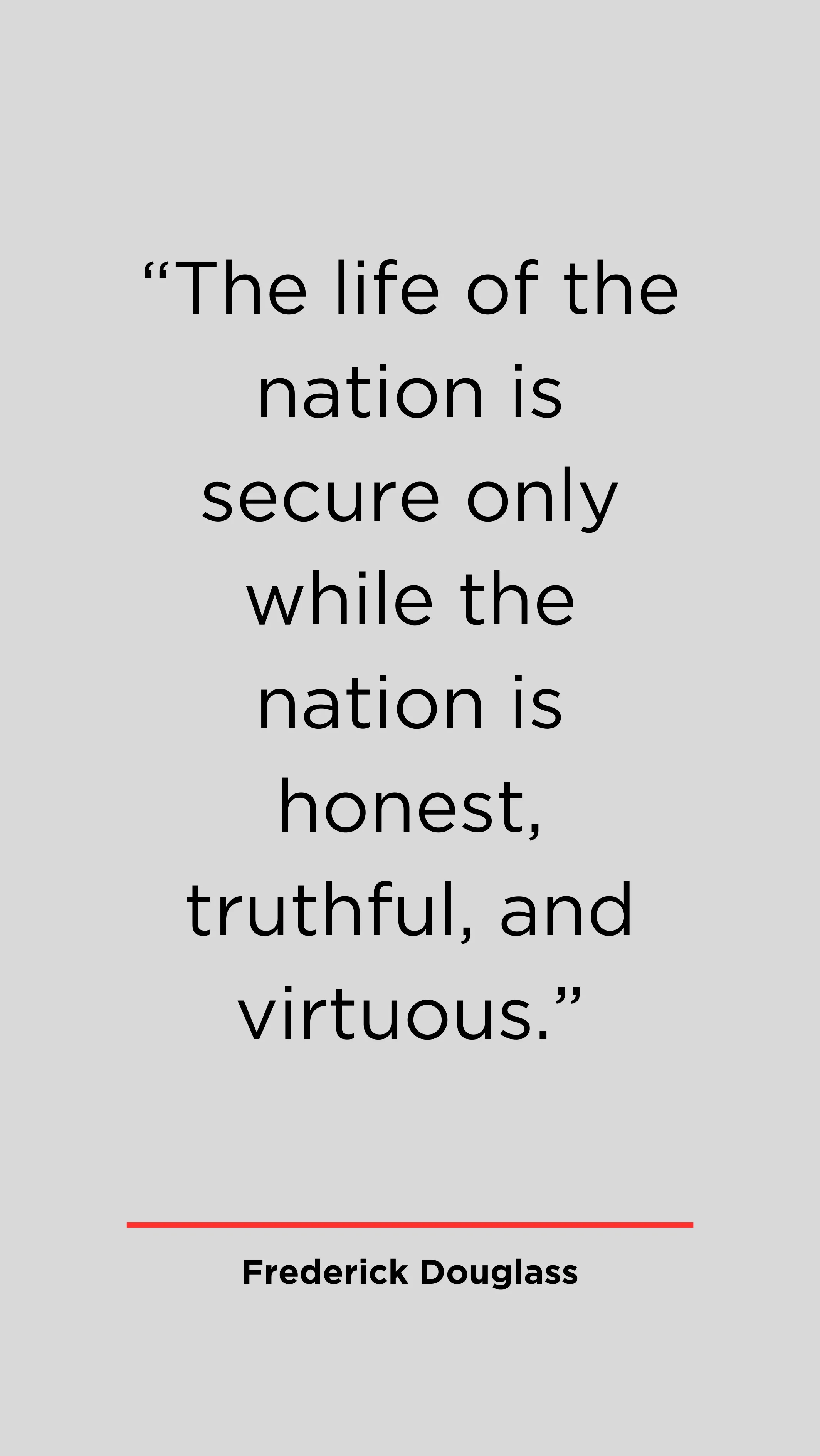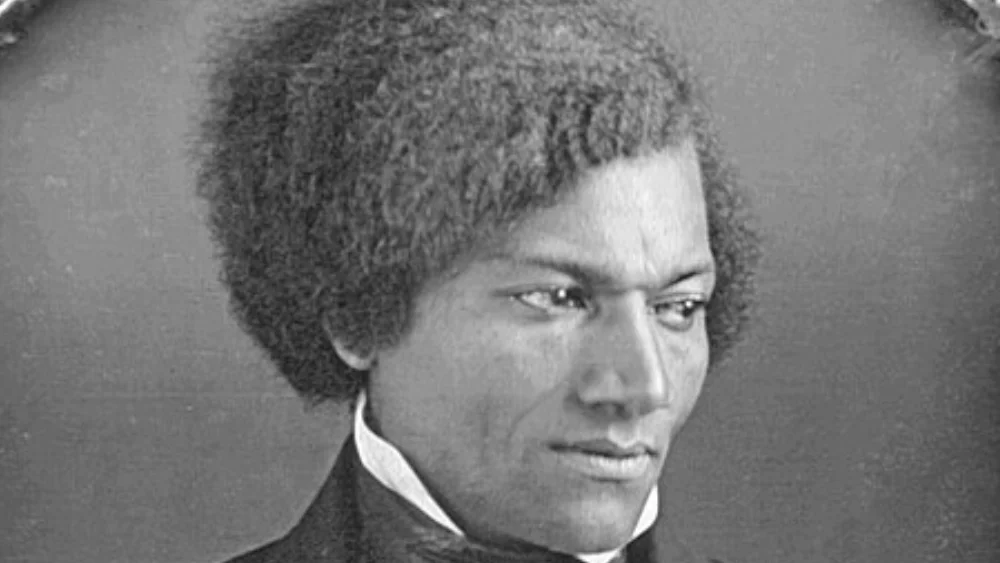Frederick Douglass, a prominent African American abolitionist, orator, and writer, is celebrated for his influential role in the fight against slavery and his impassioned advocacy for civil rights and social justice. Born on February 14, 1818, in Talbot County, Maryland, Douglass’ life and activism were characterized by his commitment to education, his powerful rhetoric, and his unwavering dedication to the cause of emancipation.
Early Life in Slavery
Douglass was born into slavery on a farm in Maryland, but the exact date of his birth wasn’t recorded. He believed he was born in February 1818 and celebrated his birthday on February 14th. Most of what we know about his life comes from his own words. He wrote three autobiographies, and although there may be some small errors, most of what he said has been verified. Like many other enslaved children, Douglass was separated from his mother, Harriet Bailey, at a young age. He was raised by his grandmother, Betsey Bailey. Moreover, his grandmother was responsible for caring for many other young, enslaved children as well.
Despite the oppressive conditions of his upbringing, Douglass exhibited remarkable resilience and an unwavering spirit, ultimately defying the constraints imposed by the institution of slavery. His transformative journey from bondage to freedom served as a powerful catalyst for his later advocacy efforts, positioning him as a prominent voice in the abolitionist movement and a key figure in the fight for equality and justice in the United States.
Frederick Douglass: Escape to Freedom
Douglass’s daring escape from slavery not only represented a pivotal moment in his personal narrative but also symbolized the resilience and determination of countless individuals seeking liberation from the bonds of oppression. His arrival in Massachusetts provided him with the opportunity to further educate himself and refine his eloquent oratory skills, which he would later employ in his fervent advocacy for the abolition of slavery and the promotion of civil rights for all.
Embracing his newfound role as a prominent abolitionist, Douglass fearlessly used his own experiences as a formerly enslaved individual to shed light on the institution’s brutalities and galvanize support for the anti-slavery movement. His powerful speeches and writings served as a clarion call for social justice, inspiring a generation of activists and contributing significantly to the momentum that ultimately led to the eradication of slavery in the United States.
Power of Oratory and Writing
Through his compelling oratory and eloquent writings, Douglass adeptly conveyed the horrors of slavery and the urgency of the abolitionist movement, appealing to the collective conscience of the American public and compelling them to confront the injustice perpetuated by the institution. His ability to articulate the human toll of slavery, coupled with his impassioned calls for social reform, resonated deeply with audiences, transcending the boundaries of race and class and fostering a sense of empathy and solidarity among individuals dedicated to the cause of freedom and equality.
Douglass’ masterful use of language and rhetoric not only exposed the inherent contradictions of a nation founded on the principles of liberty and equality but also inspired a profound reconsideration of the societal norms that perpetuated systemic oppression. His writings and speeches, characterized by their clarity, passion, and intellectual rigor, continue to serve as poignant reminders of the transformative power of words in igniting social change and advocating for the fundamental rights and dignity of all individuals.
Frederick Douglass: Leadership in the Abolitionist Movement
Douglass’ collaboration with influential abolitionist leaders, such as William Lloyd Garrison, demonstrated his ability to unite diverse voices under a common mission and to strategically mobilize resources and support for the cause of emancipation. His unwavering dedication to the principles of equality and justice, combined with his persuasive advocacy, propelled him to the forefront of the abolitionist movement, where he played a pivotal role in shaping its trajectory and guiding its strategic initiatives.
Through “The North Star” and other publications, Douglass effectively utilized the platform of the press to amplify the voices of the oppressed and to disseminate powerful arguments against the institution of slavery. His editorial contributions not only provided a platform for marginalized perspectives but also fostered a sense of community and solidarity among abolitionists, inspiring a collective commitment to achieving the long-overdue goal of abolishing slavery in the United States. Douglass’ visionary leadership and his ability to galvanize support for the abolitionist cause continue to serve as a beacon of inspiration for contemporary advocates striving for social justice and equality.
Advocacy for Civil Rights and Suffrage
His impassioned calls for the recognition of African American citizenship rights and his relentless pursuit of suffrage for all individuals, regardless of race or gender, played a pivotal role in shaping the discourse surrounding the post-Civil War reconstruction era. Douglass’ tireless efforts to secure constitutional amendments guaranteeing civil rights and voting rights for African Americans represented a significant step forward in the advancement of equality and representation within the American political landscape.
Douglass’ unwavering commitment to the principles of equality and justice extended beyond the immediate concerns of his era, serving as a catalyst for future generations of civil rights activists and suffragists. His advocacy for the enfranchisement of all individuals, coupled with his fervent denouncement of racial discrimination and systemic oppression, left an indelible mark on the trajectory of the civil rights movement, inspiring a legacy of resilience and determination in the ongoing pursuit of equal rights and opportunities for all America.
Frederick Douglass: Diplomacy and International Activism
Douglass’ diplomatic role as a U.S. representative to Haiti provided him with a platform to extend his advocacy for racial equality and justice to an international stage. Through his diplomatic endeavors, he sought to promote positive relations between the United States and Haiti while simultaneously championing the rights of marginalized communities and underscoring the shared struggle for liberation and empowerment across borders. His engagement with global audiences further solidified his reputation as a prominent advocate for human rights, transcending national boundaries and emphasizing the interconnectedness of the struggle for equality on a global scale.
By leveraging his international presence and engaging in diplomatic dialogues, Douglass effectively highlighted the significance of addressing systemic injustice and discrimination on a global level. His efforts to foster collaboration and understanding between nations underscored the importance of unity and cooperation in the pursuit of a more just and equitable world. Frederick Douglass’ diplomatic legacy serves as a testament to the enduring impact of advocating for human rights and social justice beyond national borders, emphasizing the pivotal role of diplomacy in advancing the principles of equality and dignity for all individuals, regardless of race, nationality, or creed.
Legacy of Activism and Social Justice
His tireless advocacy for the abolition of slavery, coupled with his unwavering commitment to promoting civil rights and suffrage for all, has left an indelible mark on the trajectory of the civil rights movement and the ongoing struggle for racial justice. Douglass’ impassioned speeches and writings, infused with moral clarity and intellectual rigor, continue to serve as a beacon of hope and resilience for those striving to confront systemic injustices and promote inclusive social change.
Moreover, Douglass’ steadfast dedication to fostering unity and understanding among diverse communities underscores the enduring significance of collaboration and solidarity in the pursuit of a more just and equitable society. His legacy as a trailblazer in the fight for human rights transcends temporal and spatial boundaries, emphasizing the timeless relevance of his message and the enduring importance of upholding the values of equality, justice, and compassion in the quest for a more inclusive and equitable world. Frederick Douglass’ enduring legacy of activism and social justice stands as a testament to the transformative power of advocacy and the capacity for individuals to effect positive change in the face of adversity.

Frederick Douglass: Influence on American History and Civil Rights
Douglass’ powerful advocacy for the abolition of slavery, coupled with his relentless efforts to promote civil rights and suffrage for African Americans, challenged the prevailing social norms of his time and laid the foundation for the advancement of civil rights in the United States. His eloquent speeches and writings, characterized by their impassioned pleas for justice and equality, galvanized a generation of activists and inspired a collective commitment to dismantling systemic racism and oppression.
Furthermore, Douglass’ unwavering dedication to fostering dialogue and understanding among diverse communities served as a catalyst for social change and highlighted the importance of empathy and solidarity in the quest for a more equitable and inclusive society. His legacy as a prominent leader in the civil rights movement continues to reverberate within contemporary discourse, reminding us of the enduring importance of confronting systemic injustices and upholding the principles of equality and human dignity. Frederick Douglass’ enduring influence on American history serves as a powerful reminder of the transformative potential of advocacy and the enduring legacy of those dedicated to the pursuit of a more just and equitable world.




